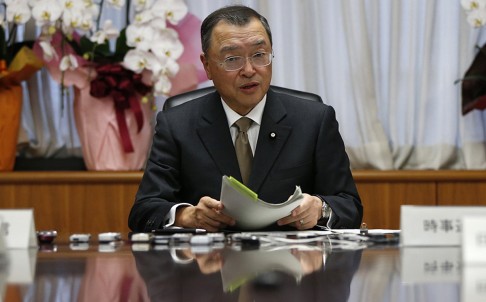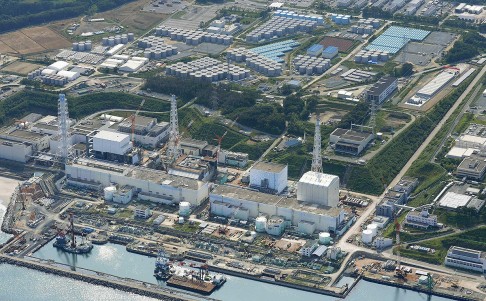Japan minister in sadomasochism bar scandal hit by fresh allegations
Hours after news that staff working for Japan's new industry minister had billed a sex club visit as a political expense, it is revealed he owns stock in power company Tepco
PUBLISHED : Friday, 24 October, 2014, 2:42pm
UPDATED : Friday, 24 October, 2014, 2:42pm
Agence France-Presse in Tokyo

Yoichi Miyazawa, Japan's new industry minister, attends a group interview in Tokyo on Thursday. Photo: Reuters
Japan’s industry minister was under renewed pressure on Friday over his stake in the operator of the Fukushima nuclear plant that he oversees, just a day after admitting his underlings had spent office cash at a sex bar.
Japan’s usually staid political scene has been left reeling from the sadomasochist club scandal and the resignations of two other newly appointed cabinet ministers who quit this week in the wake of misspending accusations.
The double resignations marked the first significant blow to the administration of Prime Minister Shinzo Abe since he swept to power in December 2012.
Industry Minister Yoichi Miyazawa, 64, who only took the job just a few days ago after predecessor Yuko Obuchi stepped down, stood firm when faced with questions about shares he holds in Tokyo Electric Power (Tepco), denying any conflict of interest and insisting he would never sell them.
The veteran politician’s new job oversees the energy sector and is the face for Tokyo’s attempts to convince a sceptical public on the safety of re-starting Japan’s nuclear reactors. They were switched off in the wake of the 2011 Fukushima disaster.
“Keeping them means I’m supporting Tepco as the minister in charge,” he told reporters on Friday.
Tokyo brushed off the issue, saying that Miyazawa had disclosed his holding of about 600 shares in the embattled company – currently worth about US$1,850 – and had agreed to place them in trust during his tenure as industry minister.
Miyazawa reportedly bought the vast majority of the stock before the atomic crisis, for which the company was severely criticised.
“I don’t think there is any problem at all,” Chief Cabinet Secretary Yoshihide Suga, the government’s top spokesman, told a regular press briefing on Friday.

An aerial view of Tepco's tsunami-crippled Fukushima nuclear plant. Japan's new industry minister owns shares in the power company. Photo: Reuters
“If someone is sworn in as a minister, the rules say he or she should refrain from share trading during their term and entrust those shares to a trust bank ... Minister Miyazawa has already started” on the process, he added.
Widespread anti-nuclear sentiment has simmered in Japan ever since a quake-sparked tsunami in March 2011 slammed into the Fukushima power plant and sent reactors into meltdown – the world’s worst atomic disaster since Chernobyl.
Also on Friday, the under-fire minister said he had disciplined staff at his political office who billed an 18,230 yen (HK$1,314) visit to an S&M bar in September 2010 as a political expense.
The venue in Hiroshima allows male patrons to whip tied-up female employees.
“I have scolded my people and ordered them to pay back the cost” of the visit, he said, adding that new office spending rules were being drafted.
Harvard graduate Miyazawa – a nephew of late prime minister Kiichi Miyazawa and a cousin of Foreign Minister Fumio Kishida – was appointed this week to replace his just-hired predecessor Obuchi, who resigned over claims she misused political funds.
Justice Minister Midori Matsushima also quit this week over a spending scandal in what opponents insisted was an attempt to buy votes.
Abe’s victory in 2012 came after years of fragile governments that swapped prime ministers on an annual basis.
The revolving door of leaders was linked to plunging approval ratings due to policy failures and various scandals involving senior ministers.
Money scandals are not uncommon in Japanese politics, where rules on spending tend to be slightly opaque, barring little except explicit bribes.
